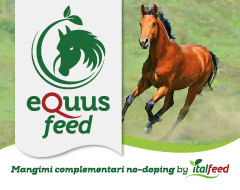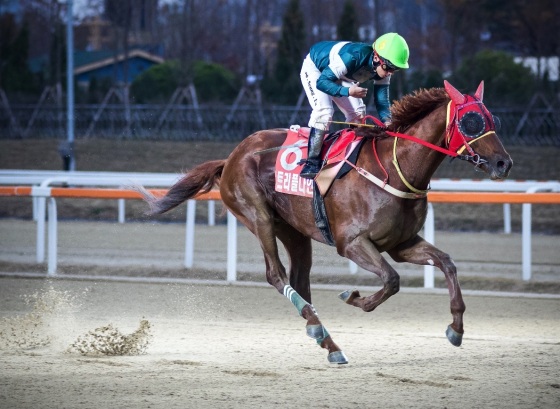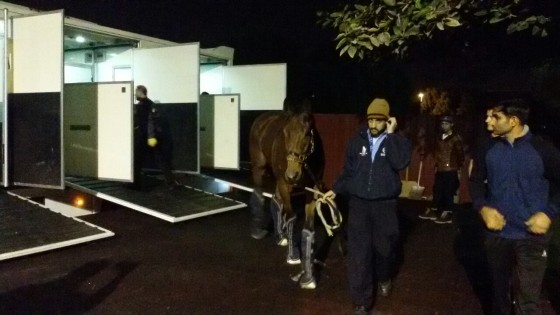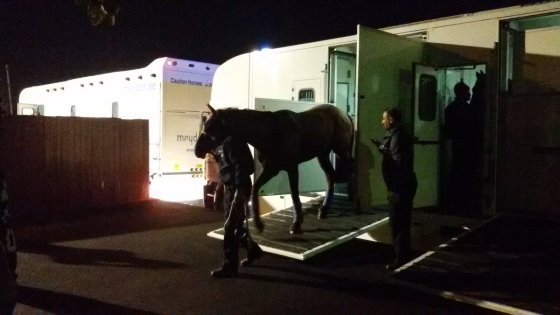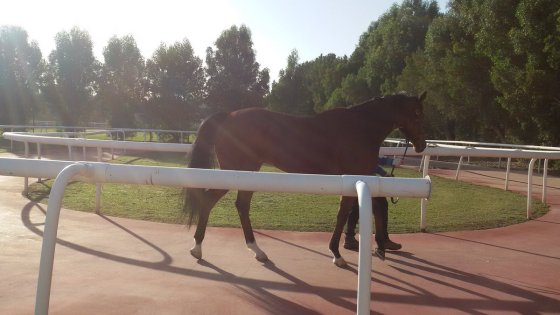New post on Horse Racing in Korea |
|

The Dubai World Cup was run for the first time. Carrying a prize purse of $4m it burst onto horse-racing’s international rich list. America’s champion racehorse, Cigar was on a 13-run winning streak when he boarded a plane bound for Dubai. His trainer, Bill Mott likened the journey to a “trip to the moon”.
Yet Cigar’s owner, Allen Paulson, an aviation magnate, was determined to take a brave step into the unknown. His star galloper duly made the trip, accompanied by fellow US runners, Soul Of The Matter and L,Carriere, both also destined for a berth in the Dubai World Cup starting gate. Cigar’s historic victory under Jerry Bailey placed the Dubai World Cup on the global racing map

1997 was the year the rains came to Dubai. Torrential downpours waterlogged the track. Race after race was lost under a curtain of water and hopes that the Dubai World Cup might be saved were dashed when Sheikh Mohammed inspected the track and, in a now famous gesture, drew his hand across his throat to signal the abandonment of the $4m race.
Instead the race was rescheduled five days later and Sheikh Mohammed ordered UAE Air Force helicopters to hover over the track to dry it out. His attention to detail was rewarded when his horse, the Sir Michael Stoute-trained Singspiel, was first past the post giving jockey, Jerry Bailey his second Dubai World Cup victory.

The Dubai World Cup achieves Group 1 status.
Having come within three-quarters-of-a-length of America’s coveted Triple Crown Silver Charm, the Kentucky Derby and Preakness Stakes star, was already a headline horse when he contested the 1998 Dubai World Cup. The trip was to be the first time the grey colt would leave the USA. The same was also true of his silver-haired trainer, Bob Baffert who, despite being one of his country’s foremost horsemen, does not possess a passport.
Fast-track travel documents were duly prepared for horse and human. Chief among Silver Charm’s opposition was the brilliant Swain, representing Godolphin. Trained by Saeed Bin Suroor and ridden by Mick Kinane, Swain had landed the King George VI and Queen Elizabeth Stakes at Ascot the previous season after sweeping all before him on the turf tracks of France. Silver Charm prevailed under Gary Stevens by a short head from Swain in the epic duel that ensued.
In 1998 the Burj Al Arab, a luxury seven star hotel, opened on an artificial island off Jumeirah Beach and is the third tallest hotel in the world.

Prize money for the Dubai World Cup was boosted from $4m to $5m.
After coming second with Swain the previous year, Godolphin trainer, Saeed Bin Suroor brings home the goods with Almutawakel in the colours of Sheikh Hamdan Bin Rashid Al Maktoum. The owner’s long-time jockey, Richard Hills was in the irons, landing one of the biggest wins of his 15-year career as Sheikh Hamdan’s first rider. This represents the first of Bin Suroor’s record six Dubai World Cup victories.
While the Dubai World Cup was played out before the watching world, just a few kilometres up the road, a classy colt by the name of Dubai Millennium was lounging in his box. He’d won his only two-year-old start by five lengths and was about to embark on a three-year-old career that would see him win five more times before coming back to Dubai for the 2000 Dubai World Cup.

Prize money was increased from $5m to $6m, to mark the fifth anniversary of the race day.
“He is the best horse we have ever had. He is a true Champion and I have never seen or owned a horse like him, the way he trains, the way he looks. He is quite outstanding. There is no horse like this horse.”
So said Sheikh Mohammed Bin Rashid Al Maktoum, Vice President and Prime Minister of the UAE and Ruler of Dubai in 1999, a year before Dubai Millennium claimed the race he was christened to win.
It was the victory that was meant to be. From the moment he is hand-picked by the far-seeing Sheikh Mohammed to bear his historic name, Dubai Millennium lives up to his promise. His trainer, Saeed bin Suroor, describes him as the most perfect racehorse he’s ever seen, his owner declares him ‘better than Daylami’ and Dubai Millennium’s first run as a two-year-old, a nine-length victory in a conditions stakes, holds the promise of greater things to come. From the moment the gates went back at Nad Al Sheba, Dubai Millennium and his jockey, Frankie Dettori dominated the Dubai World Cup. The Saeed Bin Suroor-trained star set a blistering pace, pulling away from the challenging Behrens and Public Purse off the final bend to cruise to a facile six-length victory in a course record time.

In its six renewals up to this point the Dubai World Cup had been won by US-trained horses twice. 2001 saw US star, Captain Steve redress this balance, adding one more to the US tally and another trophy to the Dubai World Cup collections of three-time winner Jerry Bailey and Bob Baffert who had been responsible for Silver Charm’s 1998 victory.
In 2001 the Palm Jumairah, one of the world’s largest man-made islands, is developed in the shape of a palm tree topped by a crescent, along the Persian Gulf.

For the fourth time since the Dubai World Cup began, a Godolphin-trained horse landed the world’s richest race. Jerry Bailey was once again in the plate as Street Cry recorded a four-and-a-half length win over Saudi Arabian-trained Sei Mei. In fact, the seventh running of the famous race was a huge success for Middle Eastern-based horses with the first five over the line coming from either the UAE or Saudi Arabia. Japan’s Agnes Digital, finishing sixth, was the best of the rest.

Godolphin jockey, Frankie Dettori, having opted for the wrong one in 2002 when he finished third on Sakhee gifting Jerry Bailey the winning ride on Street Cry by default, made sure he was on the right horse in 2003.
Moon Ballad, trained by Saeed Bin Suroor, was an impressive five-length winner, giving Dettori his second Dubai World Cup and his trainer a record fifth. Moon Ballad’s victory took Godolphin within three wins of the magical 100 Group 1 victories mark – an achievement which arrived when that year’s Dubai Sheema Classic winner, Sulamani triumphed in the Arlington Million that August.

The Dubai International Racing Carnival, now known as the Dubai World Cup Carnival, was launched.
Such was the reputation that arrived with 2004 Dubai World Cup contenders, Pleasantly Perfect and Medaglia D’Oro that not even the 2003 UAE Derby winner and Maktoum Challenge champion Victory Moon, nor Japan Cup Dirt winner Fleetstreet Dancer or Japan’s finest dirt runner, Admire Don, factored a great deal in pre-race predictions.
Race fans expected a repeat of the epic Breeder’s Cup Classic duel four months earlier in which Pleasantly Perfect ultimately triumphed. And the US superstars did not disappoint. The Richard Mandella-trained Pleasantly Perfect, under Alex Solis once again got the better of Medaglia D’Oro in the resulting contest, which went down as one of the best battles in Dubai World Cup history.
The first race meeting of the Dubai International Racing Carnival (DIRC) was run on Thursday January 29, 2004.

The tenth running of the Dubai World Cup coincided with the second Dubai International Racing Carnival. A crack field of Thoroughbreds assembled at Nad Al Sheba, including Roses in May. The Dubai World Cup was to be run without a Godolphin representative for first time after the withdrawal of injury-hit Grand Hombre on the eve of the race.
Roses in May had been unbeaten in his three-year-old season until he met Ghostzapper in the Breeder’s Cup Classic. He came to Dubai having finished second in the Donn Handicap and immediately became the most talked-about horse that year. And with good reason; Roses in May ran home the three-length winner under John Velazquez for trainer Dale Romans.

After the withdrawal of Grand Hombre the year before, Godolphin were due a good showing in the Dubai World Cup. And that was provided by their runner, Electrocutionist. The son of Red Ransom had emulated previous Godolphin World Cup winners, Dubai Millennium and Street Cry in landing the official prep race, the Al Maktoum Challenge R3 over course and distance.
On the day the Saeed Bin Suroor-trained galloper came home one-and-a-half lengths ahead of Brass Hat giving Bin Suroor a sixth Dubai World Cup and jockey Frankie Dettori a third. The race was to make headlines a second time when Brass Hat provided a positive swab and was later disqualified.

Plans are announced for the construction of Meydan, set to be the biggest racecourse in the world.
The 2007 Dubai World Cup saw the two giants of UAE racing, Godolphin and Sheikh Hamdan Bin Rashid Al Maktoum face off with their charges, Discreet Cat and the Argentine-bred, Invasor. Discreet Cat had been the runaway winner of the UAE Derby in 2006, beating Invasor into fourth.
Back in the US, both Invasor and Discreet Cat had swept all before them, Discreet Cat stringing together three victories including the G1 Cigar Mile, while Invasor was crowned Horse of the Year after remaining unbeaten in five G1 outings, including the Breeder’s Cup Classic. On the day it was the Kiaran McLaughlin-trained Invasor under Fernando Jara who got the better of the Frankie Dettori-ridden Discreet Cat, to become the second Dubai World Cup winner to cross the line in the colours of Sheikh Hamdan.

Curlin, the 2007 and later the 2008 US Horse of the Year, dominated the lead-up to the 2008 Dubai World Cup. His performance in his prep race, a facile canter to victory in a course and distance handicap at the end of February had most people believing they had seen the Dubai World Cup winner in action. In fact Curlin’s win in the world’s richest race was easier than even his biggest fans could have predicted.
The Steve Asmussen-trained colt led from two furlongs out under Robbie Albarado and won going away from the field with the record books showing a seven-three-quarter length victory margin.
The 829.8m Burj Khalifa was officially completed on October 1, 2009 to become the tallest man-made structure in the world.

This was the final year that the Dubai World Cup was to be held at Nad Al Sheba. Demolition work was to begin the day after the conclusion of the race to make way for the new Meydan Racecourse. But before any of that could happen there was the small matter of a race worth US$6m to be decided.
In the event, the US runner, Well Armed, third in the 2008 Dubai World Cup, closed out Nad Al Sheba in style, putting an international field to the sword and winning by a record 14 lengths. Aaron Gryder was in the saddle for trainer, Eoin Harty giving the US an eighth winner in the famous race.

The Dubai World Cup was run on a synthetic surface for the first time.
Prize money for the Dubai World Cup was increased to US$10m.
The first Dubai World Cup to be held at Meydan Racecourse was claimed by Brazilian runner, Gloria De Campeao under jockey, Tiago Pereira. Trained by Frenchman, Pascal Bary, Gloria de Campeao had finished runner up to Well Armed on the dirt in 2009 and proved himself just as comfortable on the synthetic surface a year later.
Gloria De Campeao had made the first move off the home turn and streaked ahead of the field, only to be joined by the Mike De Kock-trained Lizard’s Desire on the line. The judges ruled that Gloria De Campeao had won the resulting photo finish by a nose – one of the tightest finishes in Dubai World Cup history.
Meydan Racecourse opened on January 28, 2010. The first winner on the new track was Purebred Arabian, No Risk Al Maury trained by Gillian Duffield, who won the 1st round of the Al Maktoum Challange.
The 40th UAE National Day was celebrated nationwide on December, 2nd 2011 to mark their formal independence from the United Kingdom.

The year Japan won the Dubai World Cup will go down in history as the most emotional. Japan, one of the world’s great racing jurisdictions, had been fielding Dubai World Cup contenders since the race’s inception in 1996, but was yet to score a winner, having come closest in 2001 with To The Victory’s second place.
The preparations for the world’s richest race were set against a backdrop of the devastating March 11 earthquake, which triggered the tsunami that killed more than 15,000. The Japanese contingent in Dubai wore black polo shirts all week with the word “hope” emblazoned on the sleeve and the date of the tsunami on the back. Despite the upheaval in their home country, Japan still fielded three runners in the Dubai World Cup – Victoire Pisa, Transcend and Buena Vista. Victoire Pisa was Japan’s top three-year old in 2010, yet it was his jockey, Mirco Demuro who won him the race. Pulling Victoire Pisa wide at the halfway mark to circumvent an idling field, Demuro went for home, overcoming the challenge of Transcend at the finish to give Japan a famous 1-2 result.
The parade ring erupted as Katsuhiko Sumii’s galloper crossed the line, and Sheikh Mohammed was not left out of the celebrations, receiving a tearful bear hug from Manami Ichikawa, the daughter of Victoire Pisa’s owner, Yoshimi Ichikawa.

The Dubai International Racing Carnival was renamed Dubai World Cup Carnival
Godolphin had experienced a few fallow years at the Dubai World Cup, but all that was to change in 2012. Monterosso had claimed third spot the previous year behind Japanese runners, Victoire Pisa and Transcend but was back to have a second shot at the $10m race. Nine of that year’s 13 runners were Group 1 winners with an average pre-race rating of 119, making this one of the strongest runnings of the Dubai World Cup.
As Japan had scored a 1-2 result in 2011, so the UAE claimed the first two past the post in 2012, with Monterosso under Mickael Barzalona leading home Ahmed Ajtebi on Capponi. Barzalona incurred a fine from Emirates Racing Authority stewards for rising high in his stirrups to celebrate his three-length victory before crossing the line yet in the process the young Frenchman provided one of the most enduring images of a jockey celebrating a Dubai World Cup win.
Dubai International Racing Carnival became known as the Dubai World Cup Carnival in 2012.

If the Dubai World Cup is the most international race in the world, then the 2013 winner, Animal Kingdom is its most international winner. Animal Kingdom was trained in the USA by an Englishman, ridden by a jockey from the Dominican Republic and, by the time he entered the starting gate for the Dubai World Cup, owned by Australian and US connections.
USA-based runners had drawn a blank since the shift to Meydan, yet trainer, Graham Motion’s chestnut star was to reverse that trend. With Joel Rosario in the saddle, Animal Kingdom made his move to the front from just after the first turn to show his dominance ahead of British-trained stars Red Cadeaux and Planteur.

Following the conclusion of the 2014 Dubai World Cup it is announced that a new dirt surface will be installed at Meydan Racecourse.
African Story, the 2012 Godolphin Mile and dual Burj Nahaar winner had finished fifth in the 2013 Dubai World Cup. In his 2014 Dubai World Cup Carnival season he’d come second in the Al Maktoum Challenge R2 and finished eighth in the third round of the official Dubai World Cup prep race. For that reason, he did not dominate the pre-race discussions for many fans.
Yet on the day the Saeed Bin Suroor charge beat out top-class gallopers including the William Haggas-trained Mukhadram, Hong Kong’s Akeed Mofeed, 2013 Dubai World Cup runner-up, Red Cadeaux, and Japanese stars, Belshazzar and Hokko Tarumae. African Story became the seventh Godolphin-trained Dubai World Cup winner*.
*Almutawakel in 1999 ran in Sheikh Hamdan’s colours but was trained by Godolphin’s Saeed Bin Suroor)

The Dubai World Cup was run on dirt for the first time since moving to Meydan Racecourse. The nine-race card received a prize money boost to US$30m after the Dubai Turf sponsored by DP World and the Dubai Sheema Classic presented by Longines were each run for $6m. Prize money for the Dubai Kahayla Classic empowered by IPIC was increased to $1m.
The 20th running of the world’s richest race was cause for great celebration when local hero Prince Bishop defeated US superhorse, California Chrome to claim a first Dubai World Cup in the cornflower blue colours of HH Sheikh Hamdan bin Mohammed bin Rashid Al Maktoum, Crown Prince of Dubai and Chairman of the Executive Council.
Prince Bishop’s heart-stopping last-to-first run under William Buick gave long-time Godolphin trainer Saeed bin Suroor a record seventh victory in the Dubai World Cup. Following the race both Prince Bishop, a grandson of the 2000 Dubai World Cup winner, Dubai Millennium and Godolphin’s 2014 winner, African Story were retired from racing.


